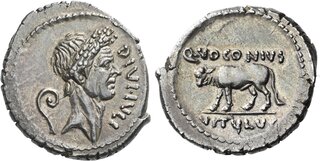| Numismatica Ars Classica > Auction 143 | Auction date: 7 May 2024 |
| Lot number: 431 Price realized: This lot is for sale in an upcoming auction - Bid on this lot  | Show similar lots on CoinArchives Find similar lots in upcoming auctions on |
| Lot description: The Dioscuri Collection. The Roman Republic. Q. Voconius Vitulus. Denarius 40 (?) or later, AR 18 mm, 4.10 g. DIVI IVLI Laureate head of Caesar r.; behind, simpulum. Rev. Q·VOCONIVS Calf walking l.; in exergue, VITVLVS. Babelon Voconia 2 and Julia 122. C 46. Sydenham 1132. Sear Imperators 329. RBW –. Crawford 526/2. Very rare and in exceptional condition for the issue, undoubtedly among the finest specimens known. A superb portrait of masterly style perfectly struck and centred on a very large flan. Wonderful old cabinet tone, Virtually as struck and Fdc Ex Triton XIV, 2011, 605 and Ira & Larry Goldberg 91, 2016, 1953 sales. From the G.K. collection and Exceptional Roman Denarii Coll. #3085. In 40 B.C., when this denarius is thought to have been struck, the conflict between Octavian and Marc Antony reached a new peak and found an uneasy resolution in the Pact of Brundisium. Octavian had returned from the Battle of Philippi with the hard task of settling some 40,000 veterans on their promised lands. As Octavian acquired land in Italy by force, his popularity was threatened. While Antony was away in the East, his wife Fulvia and brother Lucius Antonius preyed upon Octavian's misfortune by harassing him with political attacks that stirred the veterans of Antony against those of Octavian. Lucius gathered his brother's veterans and gained permission to wage war on Octavian, who was able to intercept Lucius' northward trek and force him to take refuge in Perusia. The Perusine War (41-40 B.C.), which had all of the potential to become a new civil war, was reduced to a brief event when the threat of starvation caused Lucius to surrender in February of 40 B.C. Though Octavian took revenge upon the Perusians, he took no direct action against Lucius or Fulvia. Indeed, he pardoned Lucius and soon assigned him to a promagistracy in Spain, where he died soon thereafter. Fulvia also died in the aftermath of the war. The siege in Perusia, the deaths of his brother and wife, and perhaps more importantly, Octavian's assumption of power in Gaul upon the death of Antony's governor there, alarmed Antony, who sailed West in October of that year. Upon arriving at the port of Brundisium in the spring of 40 B.C., Antony was refused entry to the harbour by Octavian's commander. Antony responded by besieging Brundisium and strengthening his ties with Sextus Pompey, Octavian's nemesis in the West. Hoping for damage control, Octavian hastily divorced his wife Claudia, married Sextus Pompey's sister-in-law, and led an army to the southern port. Fortunately for Rome, cool heads prevailed, and the triumvirs ironed out their differences. The resulting pact confirmed Antony's control of the East and Octavian's control of the West, and bound the men through the ultimately incendiary marriage of Antony and Octavian's sister, Octavia. The two men were now able to focus on their regional goals: Antony received legions from Octavian for his planned invasion of Parthia, and Octavian received war vessels from Antony to use against Sextus Pompey. This denarius of the moneyer Q. Voconius Vitulus was struck in the midst of these alarming events. The portraits of Octavian and the deified Julius Caesar on Voconius' coinage demonstrate his allegiance to Octavian, and though the inscriptions on his coins tout his status as quaestor designate, nothing further is known of his career or fate. Some of his issues – including the denarius offered here – show a lituus beside the portrait, an indication that both Caesar and Octavian had held the augurship. The reverse type of a standing calf is strictly personal, being a punning allusion to the cognomen Vitulus, which means calf. Estimate: 75000 CHF |  |



